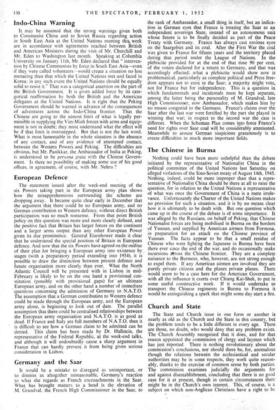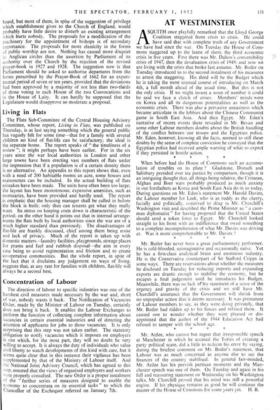Church and State
The State and Church issue in one form or another is nearly as old as the Church and the State in this country, but the problem tends to be a little different in every age. There are those, no doubt, who would deny that any problem exists. The Church Assembly recognised that it does, and for that reason appointed the commission of clergy and laymen which has just reported. There is nothing revolutionary about the commission's conclusions, nor should there be, for, anomalous though the relations between the ecclesiastical and secular authorities may be in some respects, they work quite reason- ably, thanks to the exercise of common sense by both parties. The commission examines judicially the arguments for and against disestablishment, concluding that there is no good case for it at present, though in certain circumstances there might be in the Church's own interest. This, of course, is a subject on which non-Anglican Christians have a right to be heard, but most of them, in spite of the suggestion of privilege which establishment gives to the Church of England, would probably have little desire to disturb an existing arrangement which hurts nobody. The proposals for a modification of the machinery fpr the appointment of bishops is of secondary importance. The proposals for more elasticity in the forms of public worship are not. Nothing has caused more disquiet in Anglican circles than the assertion by Parliament of its authority over the Church by the rejection of the revised prayer-book in 1927 and 1928. The suggestion now is that Parliament should be asked to authorise departures from the forms prescribed by the Prayer-Book of 1662 for an experi- mental period of seven or ten years, provided that the deviations had been approved by a majority of not less than two-thirds of those voting in each House of the two Convocations and in the House of Laity. It can hardly be supposed that the Legislature would disapprove so moderate a proposal.



































 Previous page
Previous page